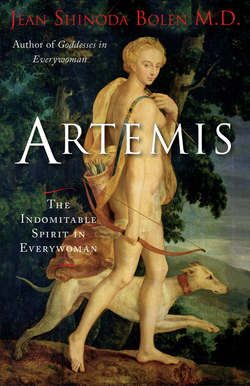Читать книгу Artemis - Jean Shinoda Bolen - Страница 28
На сайте Литреса книга снята с продажи.
Bears and Women
Оглавление“Undressing the Bear” is a chapter in Terry Tempest Williams' An Unspoken Hunger: Stories from the Field (1995). In it, Williams tells bear stories, relates dreams of bears, and shares anecdotes that point to a connection between women and bears. She writes:
We are creatures of paradox, women and bears, two animals that are enormously unpredictable, hence our mystery. Perhaps the fear of bears and the fear of women lies in our refusal to be tamed, the impulses we arouse and the forces we represent.
Among the stories in this particular chapter, there is a description of a bear dream from a bookseller friend of Terry's who tells of sharing it with a male customer:
“I dreamt I was in Yellowstone. A grizzly, upright, was walking toward me. Frightened at first, I began to pull away, when suddenly a mantle of calm came over me. I walked toward the bear and we embraced.” The man across the counter listened, and then said matter-of-factly, “Get over it.”
Terry mused: “Why? Why should we give up the dream of embracing the bear? For me, it has everything to do with undressing, exposing, and embracing the Feminine.” She explains:
I see the Feminine defined as a reconnection to the Self, a commitment to the wildness within—our instincts, our capacity to create and destroy; our hunger for connection as well as sovereignty, interdependence and independence, at once. We are taught not to trust our own experience.
It is interesting that the ferocious protective power of the bear is an attribute of Artemis and not of the Greek mother goddesses, who were powerless to protect themselves or their children from male predators and abusive partners. In fact, in Greek mythology and in the history of the Western civilization that owes so much to the Greeks, women have neither been empowered nor equal to men, however Olympian their social status. Gaia, the personification of earth who birthed all life on the planet, is abused by her husband, Uranus, after he grows increasingly resentful of her fertility. When he prevents anything further from being born, she is in great pain, until her son, Cronos, emasculates his father and consigns him to the deepest and darkest part of the underworld, replacing him as the chief god. Rhea, the mother of the Olympians, stands by helplessly as her husband, Cronos, fearing that he will have a son who will do to him what he did to his own father, swallows her first five children as soon as they are born. Finally, in her sixth pregnancy, Rhea wraps a stone in swaddling clothes and tricks him into believing he has swallowed Zeus, who grows to manhood and, with allies, overthrows his father. Demeter, the mother of Persephone, can not prevent her daughter's abduction and rape.
Good human mothers mirror their children, respond to their happy or sad emotions, and realize that their children's feelings matter. They see their individuality, their strengths, and their sensitivities. Between a healthy mother and child, there is a reciprocity and response that fosters the growth of emotional intelligence.
This is not what mother bears do. Girls in the mold of Atalanta are often very independent, but not very good at intimacy with friends or partners. The forging of emotional bonds becomes challenging to them and to those who love them. Intimacy grows through mirroring, reciprocity, empathy, compassion, and thoughtfulness. Atalanta the adult may be a woman who did not learn how to look after the feelings of others and who may not know her own emotional needs or feelings. She can not learn this from bear mother/Mother Nature or the Artemis archetype. This she can only learn from other human beings.
